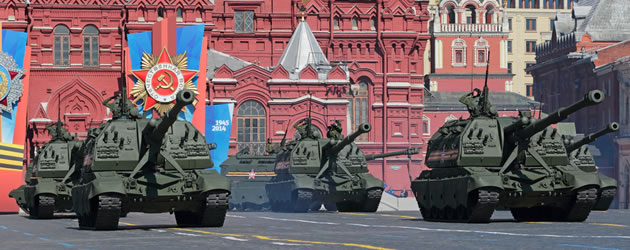
A new Cold War could strengthen the US Dollar (USD) and other safe haven currencies and could weaken the Russian Ruble (RUB).
Relations between the West and Russia are at the worst level since the fall of the Berlin Wall and the prospect of a new Cold War is growing increasingly likely as the conflict in Ukraine once again threatens to escalate into a full-scale war.
The world’s economists are watching events nervously from the sidelines and are bracing themselves for things to get worse before they get better as neither side appears close to backing down.
A new Cold War will have a big impact upon the world’s exchange rates, as investors will opt for the safer options. Over the past year, alone we have seen the Russian Ruble (RUB) tumble to multiple record lows as people abandon the currency to favour the safer havens of the US Dollar (USD) and other western currencies.
Markets are not likely to return to normal for some time as Russia prepares itself for a long economic struggle with the west. It expects sanctions imposed by Europe the US and other Western nations to stay in place until at least 2017 as it will not back down in its support of the pro-Russian rebels battling Ukrainian pro- government forces.
Russian President Vladimir Putin recently accused the West of provoking his nation into a new cold war, claiming that interference by the European Union in Ukraine was the major cause for the nation’s troubles and that Nato’s expansion close to Russia’s border was an act of aggression.
‘Nato, and the United States have military bases scattered all over the globe, including in areas close to our borders, and their number is growing. Moreover just recently it was decided to deploy special operations forces, again in close proximity to our borders,’ Putin said in an interview with a German news channel.
Incidents of Russian military encounters have increased dramatically over the past few months with Nato reporting 40 dangerously close encounters between Nato and Russian forces. London based think-tank; the European Leadership Network (ELN) said that Russia was adopting a similar provocative strategy to that seen in the Cold War.
Nato has also reported that its forces conducted over 100 intercepts of Russian aircraft in 2014, more than three times the number seen in the whole of 2013.
Total War in Ukraine
This week it was reported that Russian forces continued to enter eastern Ukraine. A ceasefire agreed earlier in the year is rapidly crumbling and both sides are preparing for a renewal of the fighting.
Ukrainian President Petro Poroshenko announced via Twitter that; ‘We are prepared for a scenario of total war. We do not want war, we want peace, and we are fighting for EU values. Russia doesn’t respect any agreement.’
With tensions rising, the prospect of more economic sanctions being imposed by the West onto Russia has increased, causing economists to grow concerned over the economic impacts over such action.
The German economy has already been badly affected by the sanctions, as Russia is one of the biggest export markets for Europe’s largest economy. The fall in trade with Russia was one of the major factors, behind Germany coming close to sliding into recession in the third quarter of this year.
On Thursday Russian Foreign Minister Sergei Lavrov blamed the US and European Union for torpedoing peace efforts between the Ukrainian government and pro-Russian rebels. A report issued by the UN showed that a 1,000 people have been killed since the ceasefire was announced earlier in the year.
‘Throughout the Ukrainian crisis our country has consistently sought to help Ukraine to overcome this difficult period in its history, Russia can’t stand by and watch what’s happening in a neighbouring fraternal country,’ Lavrov said.
With tensions set to remain high, the world’s exchange rate market and wider global economy is forecast to remain under pressure and traders jittery.

